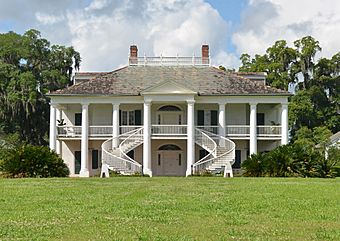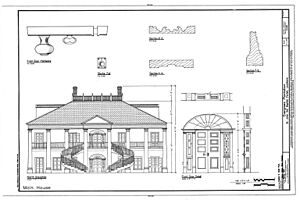Evergreen Plantation (Wallace, Louisiana) facts for kids
|
Evergreen Plantation
|
|
 |
|
| Nearest city | LA 18, Wallace, Louisiana |
|---|---|
| Built | 1790, 1832 |
| Architect | John Carver |
| Architectural style | Greek Revival, Federal |
| NRHP reference No. | 91001386 |
Quick facts for kids Significant dates |
|
| Added to NRHP | September 25, 1991 |
| Designated NHL | April 27, 1992 |
Evergreen Plantation is a very old and important farm, called a plantation, located in Wallace, Louisiana. It sits on the west side of the Mississippi River. The main house was first built in 1790 and later updated in 1832 to look like the Greek Revival style.
For many years, the plantation grew sugarcane as its main crop. This work was done by enslaved African Americans until they were freed. The plantation kept working until around 1930. At that time, a period called the Great Depression made the owners leave the house. However, the plantation continued to grow sugarcane, and it is still a working sugarcane farm today. The house was carefully fixed up in the 1940s, using many bricks from another old plantation that was taken down.
Contents
What Makes Evergreen Plantation Special?
Evergreen Plantation is special because it has 37 original buildings, and most of them were built before the American Civil War. This makes it one of the most complete old plantation sites in the southern United States.
One of the most important parts of the plantation are the 22 small houses where enslaved people lived. These houses are lined up in two rows along a path shaded by oak trees.
Other Buildings on the Plantation
Besides the main house and the slave quarters, there are other interesting buildings:
- A garconnière: This was a small house where young, unmarried men from the family or male guests could stay.
- A pigeonnier: This building was used to keep pigeons. Having a pigeonnier showed that the plantation owner was wealthy and important.
- An overseer's cottage: This was where the person who managed the daily work on the plantation lived.
- Barns: There are also barns from the late 1800s that were used for farming.
A National Historic Landmark
Evergreen Plantation is so important that it was chosen as one of the first 26 places on the Louisiana African American Heritage Trail. This trail helps people learn about the history and culture of African Americans in Louisiana.
In 1992, Evergreen Plantation was named a National Historic Landmark. This means it is a place of great historical importance to the entire country. The house is not open for public tours right now.
Who Helped Restore It?
A wealthy woman named Matilda Geddings Gray (1885–1971) helped pay for the restoration of the plantation in the 1940s. Thanks to her efforts, this historic site was preserved for future generations.
See also
- Whitney Plantation Historic District, another important plantation nearby
- Louisiana African American Heritage Trail
- National Register of Historic Places listings in St. John the Baptist Parish, Louisiana
- List of National Historic Landmarks in Louisiana
- Plantation complexes in the Southern United States
 | Laphonza Butler |
 | Daisy Bates |
 | Elizabeth Piper Ensley |




